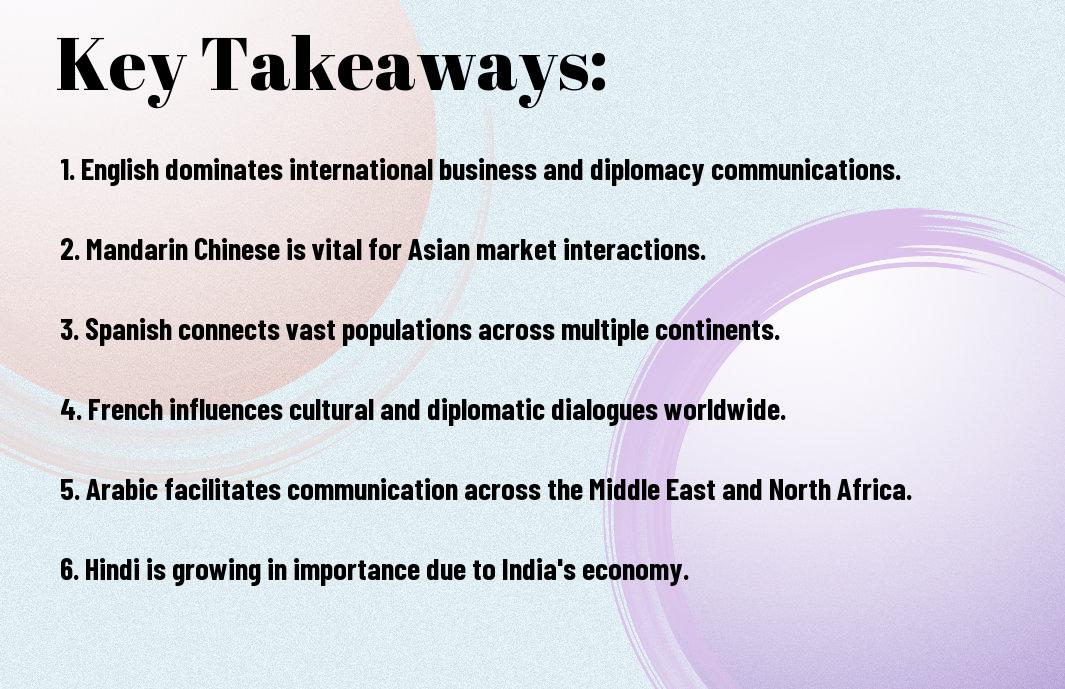As you navigate the complexities of global interaction, you’ll notice that certain languages dominate your conversations, media, and online content. Your ability to communicate effectively relies on understanding these languages, which have become the cornerstone of international exchange. You may wonder which languages hold the most sway, and how they impact your daily life, from business to social media. This essay will explore the most influential languages, shedding light on their significance and your role in the global conversation.

Key Takeaways:
To understand the dynamics of global communication, it’s imperative to identify the languages that have the most significant impact. Here are the key points:
- The English language plays a dominant role in global communication, serving as the primary language for international business, science, and technology.
- The use of Mandarin Chinese is increasingly significant due to China’s growing economic influence, making it a key language for trade and cultural exchange.
- The spread of Arabic and Spanish is also notable, given the large number of native speakers and the geographic reach of these languages, which contributes to their importance in global communication networks.
Language Dominance
Your understanding of language dominance is shaped by the most widely spoken languages in the world, which have a significant impact on global communication.
English as a Global Language
Around the globe, English is the language of international business, science, and entertainment, making it the most dominant language in the world, and you likely use it to communicate with people from different countries.
Mandarin Chinese as a Rising Power
Language skills in Mandarin Chinese are becoming increasingly valuable, as China’s economic influence expands, and you may find yourself needing to learn this language to stay competitive in the global market.
Global economic trends indicate that Mandarin Chinese will continue to grow in importance, and as you consider the languages that will shape the future of international communication, you should take into account the rising status of Mandarin Chinese, which is already spoken by over a billion people, and its potential to rival English as a global language.

Historical Influence
Even as you explore the history of languages, you’ll notice that some have had a lasting impact on global communication. The influence of ancient languages can still be seen in modern languages today, shaping the way you express yourself and understand others.
Latin and its Legacy
Around the time of the Roman Empire, Latin emerged as a dominant language, and its legacy can be seen in many modern languages, including your own, as you use words derived from Latin roots in your daily conversations.
Arabic and its Impact on Science and Culture
Always a significant force, Arabic has contributed greatly to your understanding of science, mathematics, and culture, as you find Arabic terms and concepts woven into your knowledge of these fields.
And as you probe deeper into the history of Arabic’s influence, you’ll discover that it has had a profound impact on the development of various sciences, including mathematics, astronomy, and medicine, with many Arabic terms and concepts becoming an integral part of your vocabulary and understanding of these subjects.
Economic Factors
To understand the influence of languages in global communication, you should consider the economic factors at play. Some key points to note include:
- Global trade
- Commerce
As you explore the role of languages in the economy, you can find more information in My Guide to the Most Influential Languages in the World as a language learner. Any language you choose to learn will impact your career prospects.
Trade and Commerce
Alongside economic growth, a number of languages have emerged as key players in international trade. You will find that languages such as English, Mandarin, and Arabic are dominant in global commerce, facilitating communication between nations and driving economic development.
Global Business and Language
Business leaders recognize the importance of language skills in today’s global market. You need to be able to communicate effectively with clients, partners, and colleagues from diverse linguistic backgrounds to succeed in international business.
For instance, as you navigate the complexities of global business, you will encounter various languages that hold significant economic value. You may find that speaking multiple languages, such as Spanish, French, or German, can give you a competitive edge in your career, allowing you to connect with customers, negotiate deals, and expand your business into new markets. You will discover that language skills are imperative for building strong relationships with international partners and staying ahead in the global economy.
Cultural Exchange
Keep in mind that languages play a significant role in shaping your understanding of the world. As you engage with different cultures, you’ll find that language is a key factor in facilitating exchange and cooperation.
Language and Identity
Culturally, your language helps define your sense of self and community, influencing your perceptions and interactions with others. You’ll notice that language is often closely tied to identity, shaping your values and beliefs.
Language and Media
Beneath the surface of global communication, your access to information is often determined by the languages you speak. You’ll find that language can limit or expand your access to media, shaping your worldview and cultural knowledge.
In fact, as you explore the role of language in media, you’ll discover that it has a profound impact on your ability to engage with global events, ideas, and cultures. You’ll see that languages like English, Spanish, and Mandarin dominate international media, while others may be largely absent, limiting your exposure to diverse perspectives and ideas.
Technological Advancements
Unlike traditional methods, technological advancements have revolutionized the way you communicate globally. You can explore The 10 Most Spoken Languages In The World to understand the impact of technology on language learning.
Internet and Social Media
Above all, the internet and social media have made it easier for you to connect with people from diverse linguistic backgrounds, fostering global communication and cultural exchange.
Language Learning and Translation Tools
Adeptly, language learning and translation tools have become crucial for effective global communication, enabling you to overcome language barriers and engage with people from different parts of the world.
Learning a new language has become more accessible than ever, thanks to the array of language learning and translation tools available to you. You can now use online resources to learn languages at your own pace, and translation tools to communicate with people who speak different languages, making global communication more efficient and effective for you.
Regional Languages
After exploring global languages, you’ll find that regional languages play a significant role in shaping your communication. You’ll notice that certain languages dominate specific regions, influencing culture and trade.
Spanish and Portuguese in the Americas
Linguistically, you’ll observe that Spanish and Portuguese are prevalent in the Americas, with your interactions often involving these languages in business and tourism.
French and German in Europe
Similarly, you’ll discover that French and German are prominent in Europe, with your travels often requiring knowledge of these languages to navigate effectively.
A closer look at French and German in Europe reveals that you’ll encounter these languages in various aspects of your life, from education to entertainment, making them crucial for your understanding of European culture and communication.
To wrap up
Conclusively, you now have a sense of the most influential languages in global communication. You see that your ability to speak languages like English, Mandarin, or Spanish can significantly impact your interactions worldwide. As you navigate the complexities of global communication, your understanding of these languages will serve as a foundation for forging connections across cultures, and you will be better equipped to engage with diverse perspectives and ideas.
FAQ
Q: What are the most influential languages in global communication and why are they significant?
A: The most influential languages in global communication include English, Mandarin, Spanish, Arabic, and French. These languages are significant because they are widely spoken and are often used as official languages in international organizations, business, and diplomacy. English, for instance, is the primary language of international business, science, and technology, while Mandarin is the most spoken language in the world, with a large number of native speakers. Spanish and Arabic are also widely spoken and are official languages in many countries, while French is an official language in several international organizations, including the United Nations.
Q: How do these languages impact global communication and international relations?
A: The most influential languages in global communication have a profound impact on international relations, trade, and cultural exchange. They facilitate communication between people from different countries and cultures, enabling the exchange of ideas, goods, and services. For example, English is often used as a lingua franca in international business meetings, while Arabic is an important language for communication in the Middle East and North Africa. Additionally, the spread of these languages has also led to the exchange of cultural practices, values, and beliefs, promoting cross-cultural understanding and cooperation. The dominance of these languages can also influence the way information is disseminated and consumed globally, shaping public opinion and international policy.
Q: What is the future of language in global communication, and will the dominance of these languages continue?
A: The future of language in global communication is likely to be shaped by technological advancements, demographic changes, and shifting global power dynamics. While English is likely to remain a dominant language in global communication, the rise of emerging economies such as China and India may lead to an increased use of Mandarin and other languages. Additionally, the growing importance of social media and online communication may lead to the emergence of new languages or dialects, such as pidgins or simplified languages. Furthermore, language learning and translation technologies are becoming increasingly sophisticated, making it easier for people to communicate across language barriers, which may reduce the dominance of a few select languages and promote greater linguistic diversity in global communication.

